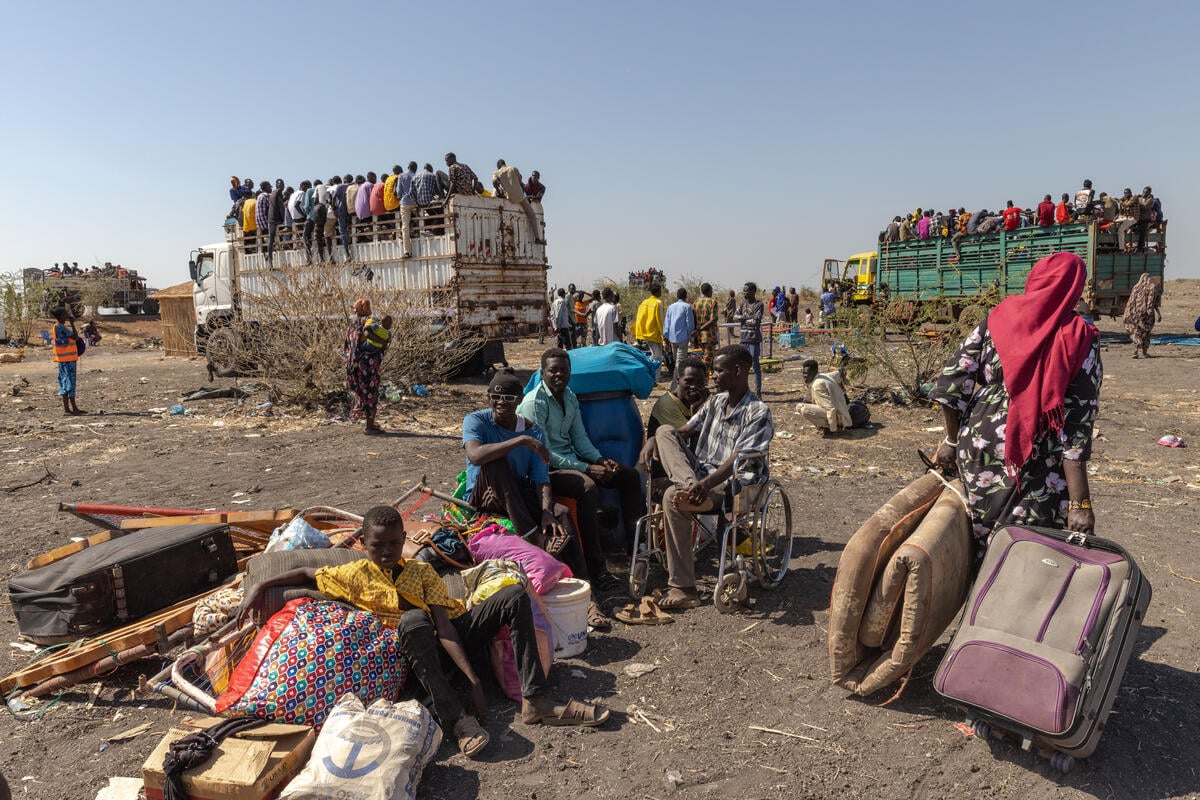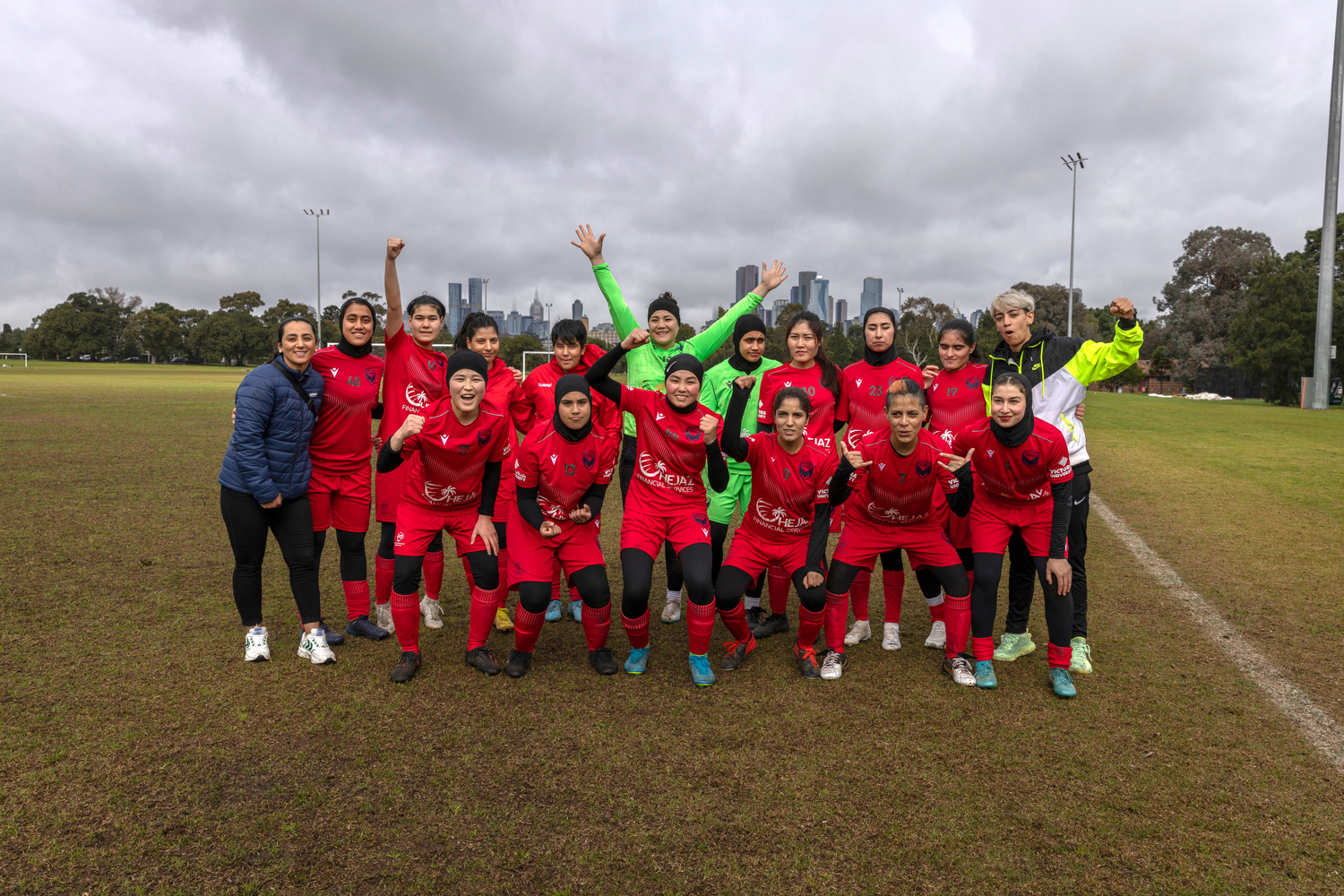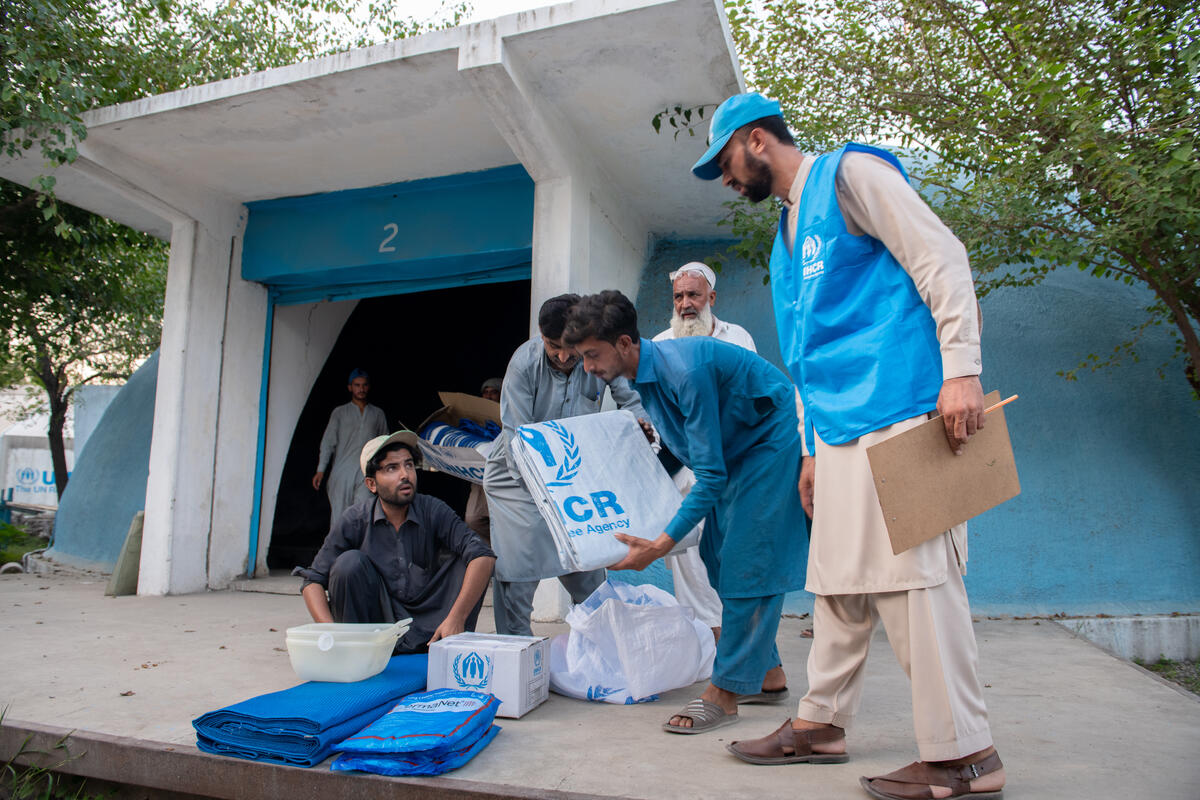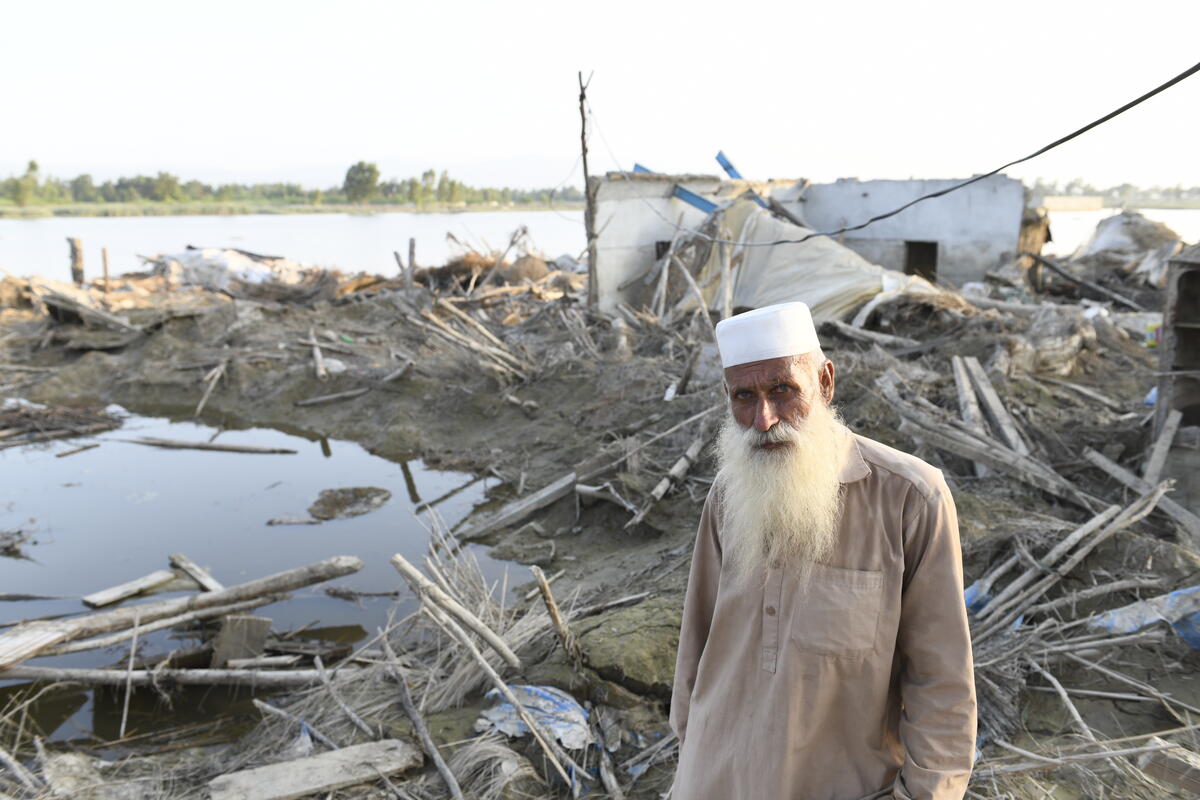Afghanistan Humanitarian Update No. 36
Afghanistan Humanitarian Update No. 36
At a Glance:
- End of Jalozai ordeal in sight
- UNHCR Chief of Mission back in Kabul
- Relocations, new arrivals at Pakistan's Chaman border
- Security concerns delay aid convoy from Iran
- Man shot in Makaki camp inside Afghanistan
- Fourth Uzbekistan flight arrives
End of Jalozai ordeal in sight
UNHCR on Monday is scheduled to begin transferring Afghan refugees from the squalid Jalozai camp near the northern Pakistan city of Peshawar to a new camp. The planned move follows an agreement reached on Saturday with provincial authorities in Pakistan's North-West Frontier Province. Also, in a departure from their previous position, the authorities agreed for UNHCR to supply aid to the "unofficial" part of Jalozai camp to help non-Pashtun Afghans who are reluctant to move to a camp situated in a Pashtun tribal area.
The new site is located at Kotkai, in Bajaur tribal agency, 120 kms north of Peshawar. It could house up to 20,000 people. It is already equipped with tents, latrines and water bladders. The transfer will start early in the morning Monday and will continue as long as UNHCR can find people willing to move. One truck and 13 buses will be used for the transfer.
Roughly 500 people are expected to be moved on Monday. The first to be moved will be Afghan Pashtuns who arrived after September 11 and have since lived on the edge of Jalozai camp without aid, proper shelter or clean water. During a recent visit to the site, UNHCR officials were beseeched by refugees asking for aid. Many were sleeping in "tents" stitched together from pieces of clothing and plastic bags and supported by sticks. The dusty, treeless site - a former riverbed - becomes very cold at night and very hot during the day. The site currently holds about 5,000 people.
UNHCR Chief of Mission back in Kabul
UNHCR's Chief of Mission for Afghanistan, Filippo Grandi, returned to Kabul on Saturday along with a group of other senior United Nations officials. The group landed at Bagram airport and drove into Kabul through the Shomali plain.
Grandi met with UNHCR staff, including four women who had been barred from working in the office for 5 years by the Taliban regime. He found the UNHCR staff in good spirits and the office intact.
More UNHCR staff will be deployed in Afghanistan over the next few days, trying to re-start the refugee agency's work in war-ravaged Afghanistan. UNHCR offices in Herat and Kabul have now re-opened. The office in Mazar-i-Sharif has been thoroughly looted and new premises have to be found. The status of UNHCR offices in Kandahar and Jalalabad is still unclear.
Relocations, new arrivals at Pakistan's Chaman border
UNHCR staff at Pakistan's Chaman border relocated 1,445 refugees (318 families) on Saturday from the Killi Faizo border site to Roghani camp. A fleet of 18 extravagantly decorated locally-hired buses and 19 colourfully painted trucks adorned with chimes transferred the refugees along the dusty, 16-kilometre route from the Chaman border to the camp at the foot of the Kohjak mountains.
Also on Saturday, aid workers at Killi Faizo pre-registered 961 Afghans (186 families) who leaked through the Chaman crossing on Friday or during the night.
UNHCR monitors noted that on Saturday some 480 persons entered Pakistan in the Chaman area, including 135 persons with documents, some 170 persons who cajoled their way over the border, and 175 persons who entered Pakistan using unofficial desert routes. These new arrivals came mainly from Kandahar, Ghazni, Urzagan and Herat, and said they were bound for Quetta, Kuchlak and Pishin. Two wounded persons were admitted to Pakistan, and the authorities apprehended four Arabic-speaking non-Afghan women who tried to enter Pakistan disguised as Pashtuns. Some 150 Afghans, mainly families, repatriated during the day.
In addition, some 300 Afghans who were waiting for most of the day on the Afghan side of the border started pelting Frontier Corps' border guards with rocks Saturday afternoon and managed to surge across the border and to the edge of the Killi Faizo site.
Some Taliban soldiers were still present Saturday in Afghanistan's border town of Spin Boldak and tried to control the hundreds of Afghan men, women and children who were desperate to reach the safety of the Killi Faizo site.
Killi Faizo sheltered 2,164 persons (432 families) as of Saturday evening, plus the new arrivals who were being temporarily accommodated in the registration and waiting-area tents. Killi Faizo currently has some 120 unused tents that will be used to shelter the newcomers once they are pre-registered.
Roghani site further inland from the frontier officially shelters some 3,168 Afghans (673 families), not including the people who arrived on the last relocation convoy Saturday. Relocation convoys from Killi Faizo continued Sunday, and staff at the border site were pre-registering the newest arrivals.
Security concerns delay aid convoy from Iran
Uncertainty about the security in the western Afghanistan town of Herat has further delayed the departure of an aid convoy from north-eastern Iran to Herat. The convoy is the first organized jointly by the Iranian Red Crescent Society and UNHCR since the withdrawal of aid agencies from Afghanistan in September.
Iranian authorities are now seeking security guarantees from Northern Alliance forces for the convoy that was scheduled to leave the Iranian town of Mashad on Saturday for Herat via the north-western Afghanistan border town of Islam Qala. Sporadic fighting has been reported in Herat, which fell to the Northern Alliance on 14 November. There are also uncertainties about the safety of the humanitarian convoy on the road from the border to Herat, some 150 kms inland.
The 15-truck convoy is ready and waiting for the Iranian government green light to leave Mashad. The supplies to be delivered include 2,000 pieces of plastic sheeting and 10,000 blankets from UNHCR for more than 12,000 people in the displaced persons camp in Herat. The camp houses an estimated 200,000 displaced Afghans. Because of the approaching winter, the people in the camp are in urgent need of shelter and other material.
Security conditions permitting, UNHCR expects to send in more emergency supplies from neighbouring countries, including Iran, to help stabilize populations that may otherwise be further displaced for assistance-related reasons. UNHCR believes, however, that any Afghans who remain fearful for their safety should have unqualified access to asylum in neighbouring countries.
Man shot in Makaki camp inside Afghanistan
Aid workers have reported the shooting of a man in the vicinity of Makaki camp inside Afghanistan near the border with Iran. Makaki was also the scene of the fatal shooting of a 12-year-old boy more than ten days ago. The injured Afghan man received emergency treatment in Makaki camp before being transferred to a hospital in the Iranian border town of Zabol. UNHCR has repeatedly raised its concerns for the safety of Afghans in Makaki camp, which is right on the edge of Afghanistan's south-western border with Iran.
More displaced Afghans are reported to have arrived in the camp, which now has some 5,000 people. Late last week, Iranian authorities transferred more than 4,000 people from around Makaki to Mile 46, a second camp for displaced Afghans, some 50 kms south of Makaki and also inside Afghanistan. Mile 46 now has some 5,000 displaced Afghans. Some families in Makaki declined to move to Mile 46, saying they preferred to return home instead.
NGO staff in Mile 46 are worried about the water and sanitation situation in the growing camp. They also report a high prevalence of malnutrition among children under five, particularly among those who have been moved from around Makaki.
Fourth Uzbekistan flight arrives
The fourth flight from Peshawar, Pakistan, to Termez, Uzbekistan, arrived Sunday morning with 660 tents. More flights to Termez carrying tents and plastic sheeting are scheduled over the next few days. The supplies are being pre-positioned at Uzbekistan's southern border with Afghanistan for possible use in northern Afghanistan.









